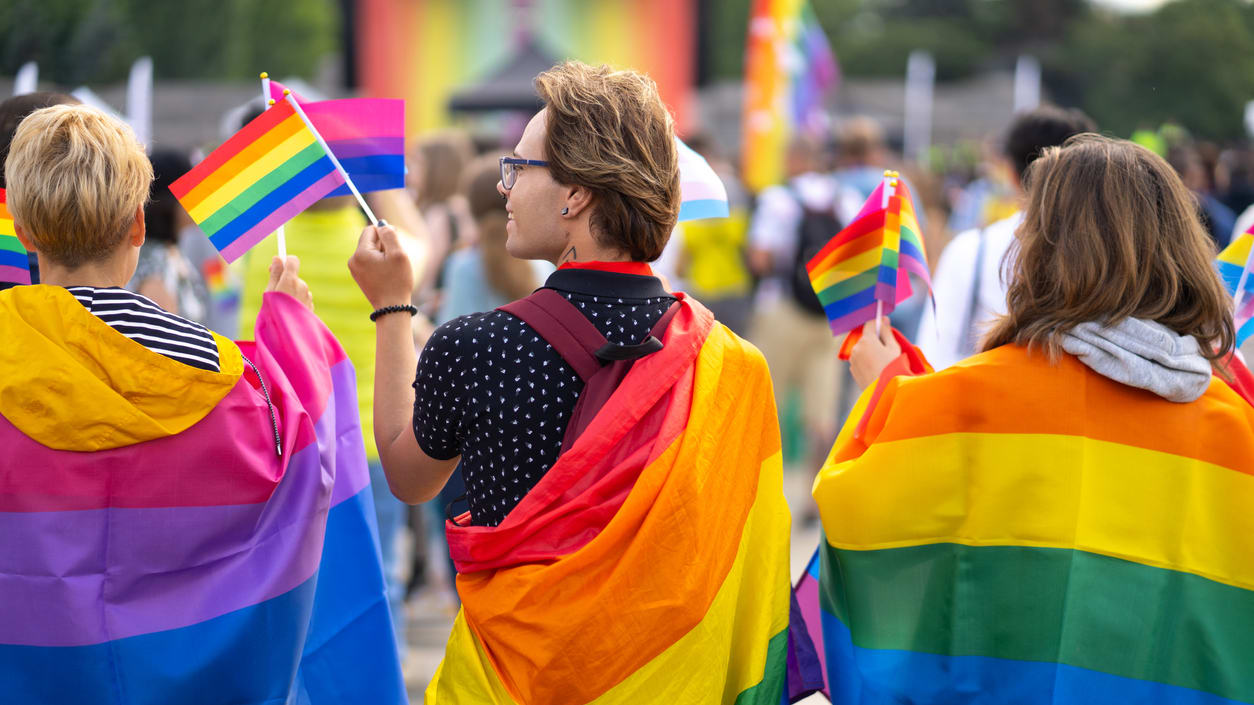Grocery chain Kroger recently settled a religious discrimination lawsuit in which two former employees alleged that the company fired them for refusing to wear an apron with a logo they believed resembled a rainbow LGBTQ Pride flag.
The U.S. Equal Employment Opportunity Commission (EEOC) filed the lawsuit on the former employees' behalf in September 2020.
Kroger agreed to pay $180,000, including $70,000 to each employee, to settle the religious discrimination lawsuit to "avoid additional costs and uncertainties of future litigation," per the EEOC. The supermarket chain also agreed to create a religious accommodation policy and give managers more-intensive training in preventing religious discrimination.
"The EEOC commends Kroger on its decision to create a policy describing the process for requesting a religious accommodation," Faye A. Williams, regional attorney in the EEOC's Memphis District Office, said in a statement. "The parties in the case worked in good faith to resolve this matter, and the commission is pleased with the resolution."
Case Details
In 2019, Kroger implemented a new dress code that required most store employees to wear an apron that prominently featured a multicolored heart symbol to support its "Kroger's Promise" campaign, according to the lawsuit.
The grocery chain said the four colors of the heart—blue, yellow, red and light blue—represented the supermarket's commitment to give customers friendly and caring service, to provide them with fresh goods, to uplift them, and to improve every day.
Two workers in Conway, Ark., felt that the multicolored heart too closely resembled the LGBTQ Pride flag. Both workers hold religious beliefs that homosexuality is a sin and that they cannot support or promote it. Kroger told the workers that the heart had no relation to the LGBTQ community.
After being reprimanded by the company for refusing to wear the apron, one employee requested to wear her nametag over the multicolored heart, while the other requested that she be allowed to don a separate apron without the heart on it.
Kroger neither granted the requested accommodations nor suggested alternative solutions, the lawsuit stated. The employees refused to wear the apron and were ultimately fired for it. The EEOC alleged that the supermarket violated religious freedoms and retaliated against the individuals.
David Hogue, the attorney representing the two employees, told The Washington Post that the lawsuit is not about casting aspersions or judgments on people in the LGBTQ community. He asserted that the suit, instead, was based on his clients' "rights not to be compelled into adopting or approving of any certain lifestyle."
Reconciling Religion with Inclusion
Although Kroger contended that its aprons weren't related to LGBTQ Pride, Jonathan Segal, an employment law attorney in Philadelphia, said an employee's religious beliefs may occasionally clash with a company's inclusion efforts.
"As with all employer policies and programs, employers need to consider reasonable accommodations if they conflict with an employee's beliefs, practices and observances, so long as it doesn't impose an undue hardship," Segal said.
Employers can push back—gently—on religious accommodation requests. They don't have to accommodate requests that create an undue hardship at work. Segal noted that employees donning offensive attire or making negative comments about the LGBTQ community would be an undue hardship for the employer. But saying that a worker doesn't have to participate in inclusion efforts would be a reasonable accommodation.
"Diversity initiatives that mandate participation in an affirmative way inconsistent with one's religious beliefs can be problematic for the individual and the company," Segal said.
Ben Greene is a St. Louis-based public speaker, LGBTQ rights activist and DE&I consultant. He explained that the efficacy of requiring inclusion in the workplace depends strongly on the initiative.
"If it is something like volunteering or pronouns being added to e-mail signatures or name badges, it doesn't necessarily need to be required," Greene said.
For example, many LGBTQ people see pronoun sharing as a subtle indicator that someone is an LGBTQ ally. When someone shares their pronouns with Greene, he knows that "they aren't likely to hate my community."
"When pronoun sharing is required, that indicator goes away because I don't know someone's motives for having that there," he said.
Greene added that every inclusion effort should include education to help employees understand why the policy change is being implemented and answer any lingering questions about it.
"When people don't understand changes that are happening around them," he noted, "they can feel lost or left behind and may react very strongly."
Advertisement
An organization run by AI is not a futuristic concept. Such technology is already a part of many workplaces and will continue to shape the labor market and HR. Here's how employers and employees can successfully manage generative AI and other AI-powered systems.
Advertisement



